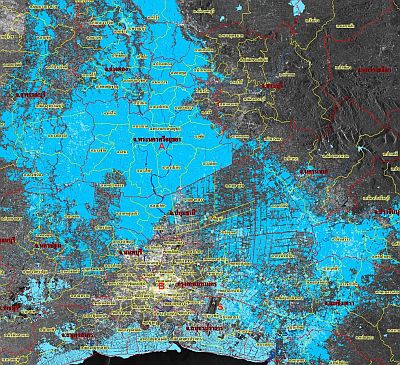Flooded Thailand
(thomas;2012-Jul-11)
 About four weeks before we were to leave for SE Asia, we realised that we might not actually make it. The reason? The heavy monsoon floods in Thailand.
About four weeks before we were to leave for SE Asia, we realised that we might not actually make it. The reason? The heavy monsoon floods in Thailand.
For a while, there was a distinct possibility that not only vast swathes of the northern fringes of Bangkok but also central Bangkok and possibly even the airport itself might be flooded (the latter is cleverly built in a swamp area formerly used as a flood overflow area).
Of course, we followed the news (and swirling rumours) with great interest: one extremely valuable and reliable source of information was the blog and Twitter account of apparently never-sleeping Thai resident Richard Barrow (see https://www.richardbarrow.com/ and https://twitter.com/#!/richardbarrow for more; his blogs and sites are really some of the best sources for up-to-date Thai tourism information).
In the end, the flood walls around the airport held and even central Bangkok was spared (at the cost of a nearly complete flooding of the suburbs and much bad blood between the stricken residents and the Thai government). But when we actually arrived, after a long flight, the plane banked a few times above the city and we saw the full extent of the disaster: there were a few tiny, tiny patches of earth, some long, spidery fingers (mostly roads) and the inner city was completely dry as well. However, the centre was surrounded by masses of water, in every direction. It was a surreal sight.
The satellite picture to the left (click for a bigger version) shows the extent of the floods end of October 2011, shortly before we left: bright blue is water; the red “B” is central Bangkok; “A” is Ayutthaya and the long, dark rectangle near “S” is the airport.
Once on the ground, we actually saw no water at all, mostly because the main roads to and from the airport are all on high dykes or flyovers. We took a night bus to the city of Nong Khai, in the north-east, and again there was almost no disruption, as far as we could tell. (The north and north-east had been the first regions to suffer but also the first to get back to normal.)
So up in Nong Khai, we saw no floods; indeed, the Mekong river levels were actually relatively low. But we saw the incredible pictures on Thai TV, a constant stream that documented the anger and desperation of some of the victims. We also learned that the flood was quite good business for the hotels in the north and north-east, as many Thais had fled the capital and the surrounding areas, to sort of dry-bernate in non-flooded regions of the country.
In Chiang Khan, always a tourist magnet for Thai people, we met a guy who had lived there in a hotel for a few weeks now, with no end in sight. He spoke English fluently (not always a given even with educated Thais) and it turned out that he was working from his hotel room, via internet and phone, with his employer, a US-multinational, footing the bill. He told us that many people he knew were doing the same. He also told us that his family had two houses in the Bangkok area: the first had been submerged at the very beginning of the floods (much faster, he said, than he and his wife could move their stuff upstairs, so almost everything downstairs was lost). The second house was flooded a few weeks later, but this time they had been prepared: everything was already safe up on the first floor.
When we commiserated with him, he just shrugged and mumbled, with a certain understated pride, that Bangkokians were used to that sort of thing. The big problem, he said, weren't the floods. It was the government which had no real idea how to deal with the water and which often sent conflicting messages and took conflicting actions. However, he continued with a smile, as we all know, governments are governments and we, the people, will quickly get back to our feet. Amazingly, he was completely unfazed about his two submerged houses and the losses he'd sustained.
This upbeat attitude was something we often saw in others as well: things were pretty bad, sure, but somehow most people seemed just not willing to stay gloomy for any length of time. They'd rather do something (or at least eat something: Thais do consume snacks at all times of the day) and in the meantime hope for better times ahead.
Want to read more? Go back to Final Budget or go on to Cobras and Other Creatures or go up to Blog
$ updated from: Blog.htxt Mon 28 Apr 2025 14:55:32 trvl2 — Copyright © 2025 Vero and Thomas Lauer unless otherwise stated | All rights reserved $



